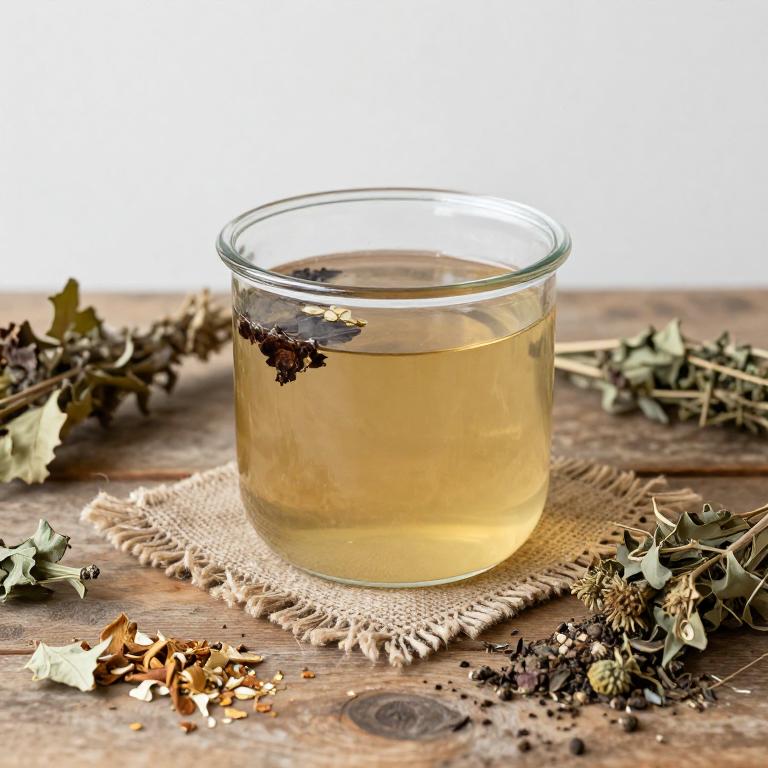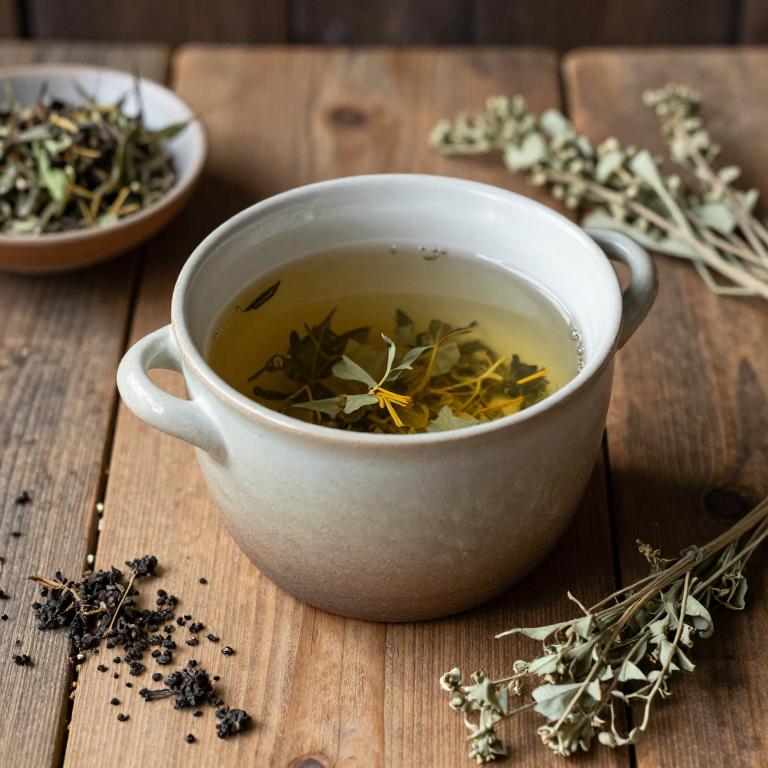10 Best Herbal Decoctions For Loss Of Appetite

Herbal decoctions have been traditionally used to address loss of appetite by stimulating digestion and improving overall gastrointestinal function.
Common herbs such as ginger, fennel, and licorice are often included in these formulations due to their soothing and stimulant properties. These decoctions work by enhancing the secretion of digestive enzymes and promoting a healthy appetite through their aromatic and warming effects. They are typically prepared by simmering the herbs in water for an extended period to extract their active compounds.
While generally considered safe, it is advisable to consult a healthcare professional before using herbal decoctions, especially for prolonged periods or in conjunction with other medications.
Table of Contents
- 1. Ginger (Zingiber officinale)
- 2. Licorice (Glycyrrhiza glabra)
- 3. Turmeric (Curcuma longa)
- 4. Chaste tree (Vitex agnus-castus)
- 5. Black pepper (Piper nigrum)
- 6. Fennel (Foeniculum vulgare)
- 7. Cumin (Cuminum cyminum)
- 8. Black cumin (Nigella sativa)
- 9. Peppermint (Mentha piperita)
- 10. Ceylon cinnamon (Cinnamomum verum)
1. Ginger (Zingiber officinale)

Zingiber officinale, commonly known as ginger, has been traditionally used in herbal decoctions to address loss of appetite.
The active compounds in ginger, such as gingerol and shogaol, are believed to stimulate digestive enzymes and enhance gastrointestinal motility, thereby improving appetite. A typical preparation involves boiling fresh or dried ginger root in water to create a warming herbal tea or decoction. This remedy is often recommended for individuals experiencing appetite loss due to digestive issues, stress, or nausea.
While ginger is generally safe for most people, it is advisable to consult a healthcare professional before using it for prolonged periods, especially for those with underlying medical conditions or taking medications.
2. Licorice (Glycyrrhiza glabra)

Glycyrrhiza glabra, commonly known as licorice root, has been traditionally used in herbal medicine to address various digestive and respiratory conditions.
When prepared as a decoction, licorice root is often employed to stimulate appetite and alleviate digestive discomfort, making it a potential remedy for individuals experiencing loss of appetite. The decoction is typically made by simmering the dried root in water for an extended period to extract its active compounds, such as glycyrrhizin and flavonoids, which may have soothing and anti-inflammatory properties. Some studies suggest that licorice root may help improve gastric secretions and enhance nutrient absorption, supporting overall digestive health.
However, long-term use of licorice decoctions should be approached with caution due to potential side effects, including hypertension and electrolyte imbalances.
3. Turmeric (Curcuma longa)

Curcuma longa, commonly known as turmeric, has been traditionally used in herbal medicine for its potential to stimulate appetite.
The active compound curcumin in turmeric is believed to enhance digestive function and improve gastric motility, which may help in cases of loss of appetite. Herbal decoctions made from Curcuma longa are often prepared by simmering the root in water to extract its beneficial compounds. These decoctions are typically used in combination with other herbs to address underlying causes of appetite suppression, such as stress or digestive disorders.
While some studies suggest curcumin may support appetite regulation, more research is needed to fully understand its efficacy and safety in treating loss of appetite.
4. Chaste tree (Vitex agnus-castus)

Vitex agnus-castus, commonly known as chaste tree, has been traditionally used in herbal medicine to support hormonal balance and address various reproductive and emotional health concerns.
Herbal decoctions made from vitex agnus-castus are often prepared by simmering the dried berries in water for several hours, allowing the active compounds to be extracted. While primarily used for conditions such as menstrual irregularities and menopausal symptoms, some studies suggest that vitex may also help stimulate appetite in individuals experiencing loss of appetite, possibly through its influence on the hypothalamic-pituitary-adrenal axis. However, it is important to note that the evidence for its efficacy in treating appetite loss is limited, and more clinical research is needed to confirm its therapeutic benefits.
As with any herbal remedy, it should be used under the guidance of a qualified healthcare provider to ensure safety and appropriateness for individual health conditions.
5. Black pepper (Piper nigrum)

Piper nigrum, commonly known as black pepper, has been traditionally used in herbal medicine for its stimulating properties.
Herbal decoctions made from black pepper can help enhance digestion and stimulate appetite in individuals experiencing loss of appetite. The active compound, piperine, is believed to increase the production of digestive enzymes and improve nutrient absorption. When prepared as a decoction, black pepper can be consumed as a tea or added to meals to encourage eating.
However, it is important to consult a healthcare professional before using it, especially for those with existing medical conditions or on medication.
6. Fennel (Foeniculum vulgare)

Foeniculum vulgare, commonly known as fennel, has been traditionally used in herbal medicine to address various digestive issues, including loss of appetite.
A decoction of fennel seeds is often prepared by simmering them in water for several minutes, allowing the essential oils and active compounds to be extracted. This preparation is believed to stimulate digestion and enhance gastric secretions, thereby improving appetite. The volatile oils in fennel, such as anethole, may contribute to its appetite-stimulating effects by acting on the gastrointestinal system.
However, it is important to consult a healthcare professional before using fennel decoctions, especially for prolonged periods or in individuals with existing health conditions.
7. Cumin (Cuminum cyminum)

Cuminum cyminum, commonly known as cumin, has been traditionally used in herbal medicine to address various digestive issues, including loss of appetite.
When prepared as a herbal decoction, cumin is typically simmered in water to extract its essential oils and active compounds, which are believed to stimulate digestion and enhance food intake. The warming properties of cumin may help improve gastrointestinal function, making it a popular remedy for individuals experiencing a diminished appetite. Studies suggest that the essential oils in cumin, such as limonene and carvone, may interact with digestive enzymes and promote a sense of fullness, encouraging better eating habits.
However, it is important to consult a healthcare professional before using cumin decoctions, especially for prolonged periods or in combination with other medications.
8. Black cumin (Nigella sativa)

Nigella sativa, commonly known as black cumin, has been traditionally used in herbal medicine for its potential to stimulate appetite.
The seeds of this plant are often prepared as a decoction by soaking them in hot water or boiling them to extract their active compounds. This herbal decoction is believed to enhance digestion and promote a sense of well-being, which can help in cases of loss of appetite. The essential oil and active components, such as thymoquinone, are thought to have mild stimulant properties that may encourage food intake.
However, it is important to consult a healthcare professional before using nigella sativa, especially for prolonged periods or in combination with other medications.
9. Peppermint (Mentha piperita)

Mentha piperita, commonly known as peppermint, has been traditionally used in herbal medicine to address various digestive issues, including loss of appetite.
Peppermint herbal decoctions are prepared by steeping fresh or dried leaves in hot water, creating a soothing and aromatic beverage. These decoctions are believed to stimulate digestive secretions and enhance gastrointestinal motility, which can help improve appetite in individuals experiencing a decrease in food desire. The active compounds in peppermint, such as menthol and methylated ethers, are thought to act on the digestive system by relaxing the muscles of the gastrointestinal tract and reducing bloating or discomfort.
While peppermint decoctions may offer some relief for appetite loss, it is advisable to consult a healthcare professional before using them, especially for prolonged periods or in combination with other medications.
10. Ceylon cinnamon (Cinnamomum verum)

Cinnamomum verum, commonly known as true cinnamon, has been traditionally used in herbal medicine to address various digestive and appetite-related issues.
When prepared as a decoction, the bark of the cinnamon tree is simmered in water to extract its essential oils and active compounds, such as cinnamaldehyde and eugenol. This herbal remedy is believed to stimulate digestive enzymes and enhance gastrointestinal motility, which can help alleviate loss of appetite. The warming properties of cinnamon may also help soothe the stomach and improve overall digestion.
While some studies suggest potential benefits, it is important to consult a healthcare professional before using cinnamon decoctions, especially for prolonged periods or in combination with other medications.